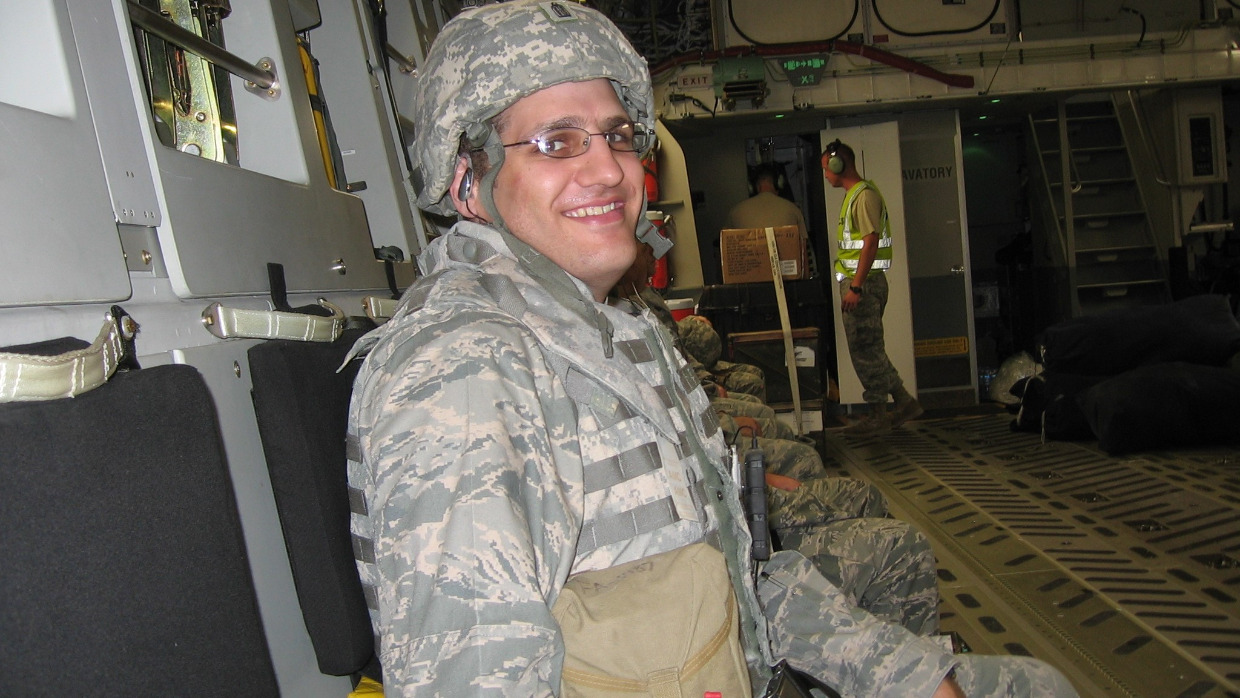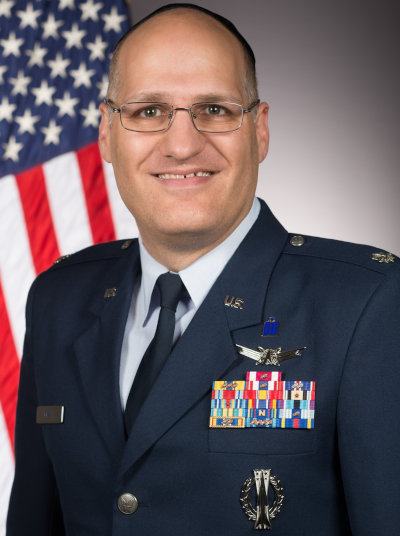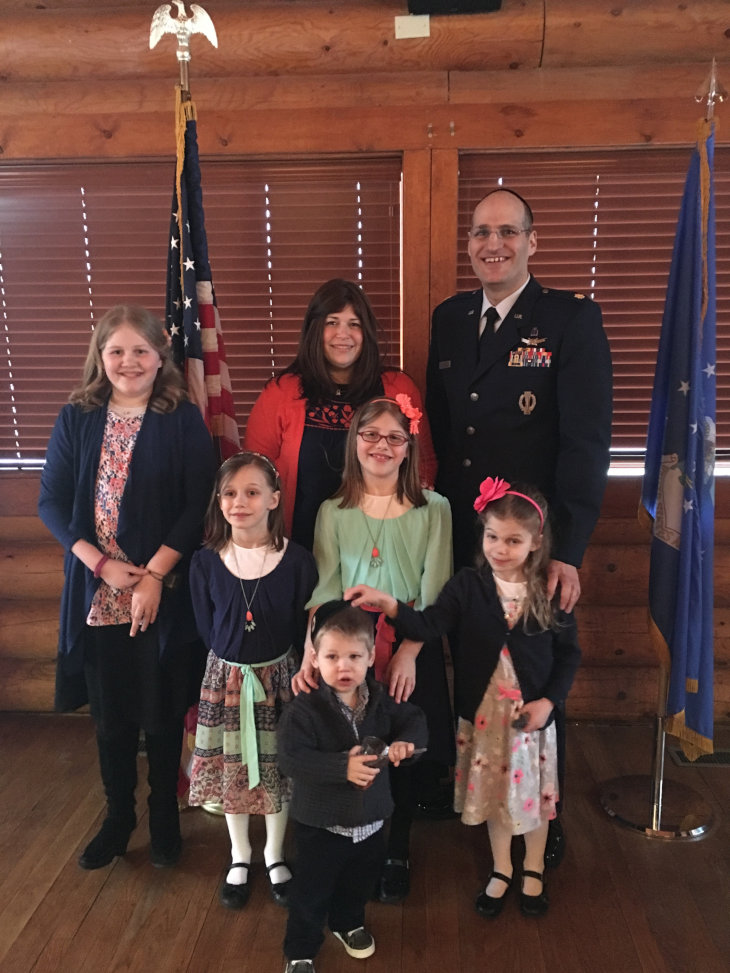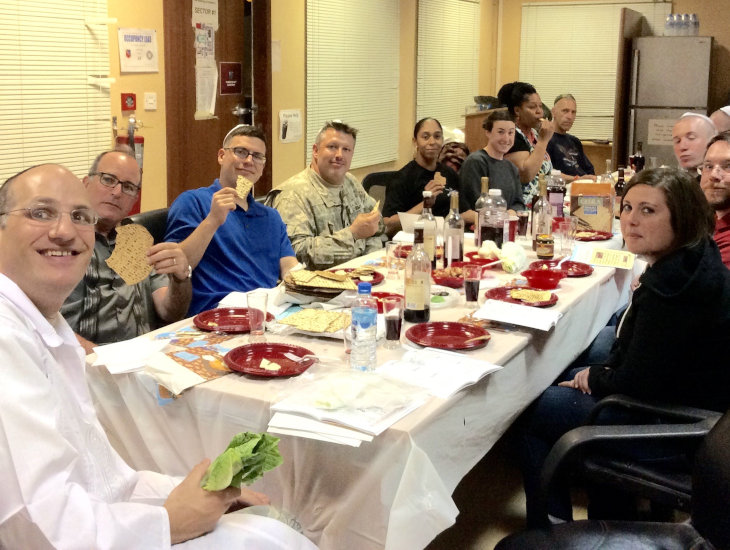 Vampire Weekend's Surprising Jewish Stories
Vampire Weekend's Surprising Jewish Stories


6 min read
Michael Bram, a Jewish Air Force chaplain, reflects on two decades of service.
When the Iraq War broke out 20 years ago, Chaplain Michael Bram was sent to Iraq to serve as a Jewish chaplain. It was his job to ensure to meet the needs of all the Jewish and non-Jewish men and women on his base.
During Sukkot, Bram built a sukkah and hosted meals there. While he was sitting in the sukkah and celebrating the holiday, mortars were falling all around him the entire time.
 Chaplain Michael Bram
Chaplain Michael Bram
“I was struck by the fact that I was in the sukkah and I felt completely protected,” he said. “Every time I see a sukkah, I think about being in that one in Iraq.”
Bram didn’t plan to become a chaplain in the Air Force. Growing up in Milwaukee, he always dreamed of becoming an astronaut.
“I majored in astrophysics at the University of Minnesota, which is not your average major for a chaplain,” he said. “I then signed up for the U.S. Air Force ROTC (Reserve Officer Training Corps) because I wanted to be an astronaut. But God had a different plan for me.”
After going to ROTC, he was sent to North Dakota for work. At the time, there was a dearth of Jewish life in the state; Chabad hadn’t even set up shop yet. Bram had a strong Reform Jewish upbringing but didn’t keep many of the rituals. Being so isolated as a Jew in North Dakota, he felt the urge to become more connected to his Judaism.
“Absence made the heart grow fonder,” he said. “It made me want what I didn’t have.”
Bram had spent a Shabbat with a Jewish senior Air Force chaplain in Denver and was so inspired he started to slowly bring Shabbat into his own life. It wasn’t easy to do since he didn’t have anyone to celebrate Shabbat with.
During the weekdays, Bram would work 24-hour shifts, where he’d do six hours of busy work and then have many more free hours to fill. He read the weekly Torah portion and all the commentaries, and decided that he wanted to continue his learning.
“I liked being in the Air Force, and someone told me I should become a chaplain,” he said. “It germinated in my head. I could keep doing what I was doing and help other Jews.”
Shortly after his stint in North Dakota, Bram left the Air Force and went to a yeshiva in Monsey to become a rabbi. It was then that he met his wife, Sara, in May of 2004. Sara, whose father was on active duty for 37 years, was used to the lifestyle. Like Bram, she was also a newcomer to Judaism.
After becoming a rabbi, Bram started serving as a chaplain in the Air Force, with Sara and his growing family by his side. Over the past two decades, the couple and their five children have lived in Alaska, Colorado, San Antonio, California, and Germany, moving every three years so that Bram could serve at another base.
 Michael and Sara Bram and their children
Michael and Sara Bram and their children
While in Alaska, Bram got called to duty in Qatar while his family stayed behind. During that time, his wife gave birth to their son, and Bram arranged for a mohel, a circumciser, in Milwaukee to fly to Alaska and perform the bris.
“I called the mohel and said, ‘I’ve got good news and I’ve got bad news: You’ve won a free trip to Alaska! But it’s in February,” Bram said.
Bram ended up Skyping into the bris from Qatar and meeting his son in person when he was five months old. Not being there for the first few months of his son’s life presented its own challenges, but Sara was used to it, coming from a military family.
In Qatar, Bram threw a huge Passover Seder that people from all different religious backgrounds ended up attending. Alcohol is severely restricted in Qatar so figuring out how to get the kosher wine in for the holiday had its challenges.

“Our wine got stuck in customs,” he said. “I called up the Defense Logistics Agency in charge of the supply military chain and told them. The distribution office is in Philadelphia, so the person I talked to drove two cases of kosher wine to the Air Force base in New Jersey. They flew the wine directly into my base and bypassed customs.”
The next day, the other wine cleared customs just in time for the Seder. Bram ended up having more than enough, and inadvertently threw a huge party for Passover.
“When people hear you are serving wine in a dry country, everyone shows up to have some,” he said. “This was the first time I had a bigger crowd the second Seder than the first one. Non-Jews showed up, too.”
After 24 years of service, Bram is soon retiring from the Air Force. “I’m here for Jews of all stripes, Christians, atheists, Buddhists, Pagans, etcetera,” he said.
He estimates that 2-3% of the people in the military are Jewish, but many of them don’t publicly identity themselves that way.
“We believe that only half of Jews put it on their records,” he said. “When they first join, a lot of them think they will be discriminated against, and they just want to blend in.”
However, once they see that they are not treated differently, they start to open up.
“If you ask them maybe eight years into their service, a lot more Jews would put it on their record,” Bram said.
Although he never got to be an astronaut, Bram feels fulfilled serving as a chaplain in the military. After officially retiring next year, he plans to move back to his hometown of Milwaukee and become a chaplain in a VA hospital.
For Bram, giving back to the country that has allowed Jews to thrive is what his work is all about.
“America is the easiest country in the history of the world for Jews,” he said. “It’s important to show gratitude to our country, help defend it, and make it a better place. We could accomplish this by serving in the military or taking on something else. We have an obligation to be involved and show gratitude.”
He continued, “I have pure gratitude.”
